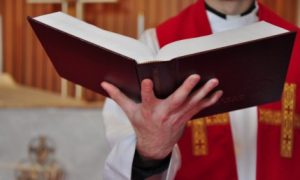The Grammar of Holiness: Part 2
You are to distinguish between the holy and the common, and between the unclean and the clean, and you are to teach the people of Israel all the statutes that the Lord has spoken to them by Moses.
Leviticus 10:10-11 (ESV)
God is the source of all holiness. Nothing is holy except by virtue of receiving holiness from God. The book of Leviticus clearly shows God is holy and he made the tabernacle holy along with everything in it. God’s command to Aaron the high priest along with all his sons the priests was to distinguish between the holy and the common, as well as between the clean and the unclean and to teach this to the people.
In this post we’ll cover the general nature of holiness, it’s connection with God and make the distinction between the holy and the common.
Because God alone is holy (Rev. 15:4) he is the sole source and fountain of holiness for all people. God’s desire for all people after the fall into sin is that they might become part of his church so that he might share his holiness with them (Heb. 12:10). But God’s holiness is pure and incompatible with sin and so it is dangerous for all sinners to be in the presence of God’s holiness. This is why God would not let anyone see his face in the Old Testament, for if they saw God in his holiness they would die. For this reason in the Old Testament God created the priesthood and the tabernacle as a safe means by which God would share his holiness with his people. In the tabernacle there is a graded holiness where the items and places in the tabernacle go from most holy to holy. The priesthood also had a graded holiness with the high priest being most holy to the holy priesthood to the Levites who carried out functions in the tabernacle apart from worship itself. Through the tabernacle, the priesthood, and the ritual sacrifices God safely shared his holiness with his people. Today, God shares his holiness safely with us through Jesus Christ who is the ultimate, final and perfect high priest and through the Divine Service and his chosen means of the holy sacraments and confession and absolution.
A fundamental distinction to make in the grammar of holiness is between what is holy and what is common. As mentioned, God is the source of all holiness. In the Divine Service in the Old Testament God strictly determined what was and was not holy. People, places, objects and even days could be made holy by God. All that was not holy was considered common. So anything in all of creation is common unless God makes it holy or it comes into contact with the occult. This distinction still holds today. So if you think of the world and everything in it all is common. Things become holy today when God declares them holy in his Word (such as the elements of the sacraments when used in accord with Christ’s mandate) or when they are blessed.
When something common is made holy this process is called sanctification. We’ll talk more about sanctification and it’s opposite desecration in the next post.
Pastor Korsch

